Accelerating the Green Transition of the Largest Economy in Southeast Asia: IDXCarbon, Net Zero Incubators for IDX-Listed Companies and ESG Metrics Integration Among ASEAN Exchanges
Introduction
The growing global urgency to address climate change has placed sustainability at the heart of business and investment strategies. For Indonesia, as one of the world’s largest emerging economies, there is a critical need for companies to align their operations with environmental goals, particularly as the country aims for net zero emissions by 2060 or sooner. The Indonesia Stock Exchange (IDX), as a major player in Southeast Asia’s financial ecosystem, can serve as a key driver of this transition by engaging listed companies in carbon markets, promoting net zero incubators and advancing the integration of environmental, social and governance (ESG) metrics. Moreover, collaboration with other ASEAN exchanges can create a unified regional framework for sustainability reporting and data systems.
The Role of Carbon Markets in Corporate Emissions Reduction
The carbon market represents one of the most promising mechanisms for reducing corporate emissions. By trading carbon credits and allowances, companies are incentivised to lower their carbon footprint, either by adopting cleaner technologies or purchasing credits to offset emissions. In Indonesia, the potential for carbon market development is vast, given the country’s significant natural resources, such as its forests and mangroves, which act as carbon sinks. Indonesia’s carbon market, IDXCarbon, was launched in September 2023. As global demand for carbon credits rises, IDX-listed companies stand to benefit from participating in the carbon markets. Understanding the structure of these markets and the economic opportunities they offer is crucial for companies looking to align with global sustainability goals while maintaining profitability.
IDXCarbon is part of the Indonesian government's commitment to reducing greenhouse gas emissions and supporting climate change mitigation targets, in line with the Paris Agreement and the net-zero emissions target by 2060 or sooner. IDXCarbon provides a platform for companies to trade carbon credits and technical approval of emissions limits, both as buyers and sellers, based on the emissions they produce and/or reduce.
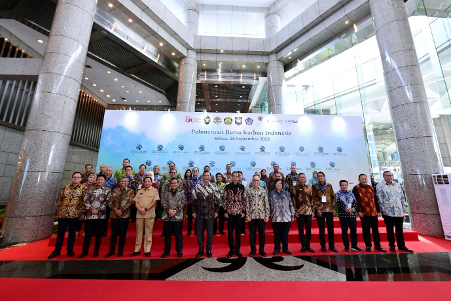
Photo Credit: IDX- IDX Carbon Launch on 26 September, 2023
This initiative is a concrete step in supporting Indonesia's commitment to the Paris Agreement to reduce carbon emissions by up to 31.89% by 2030, or up to 43.2% with international assistance. During its first year of operation, the carbon exchange has achieved several significant milestones, although challenges in terms of regulation and industry participation remain. A year after its launch, IDXCarbon recorded IDR 37.06 billion in trading value, with a total volume of 613,894 tons Co2e in 106 transactions.
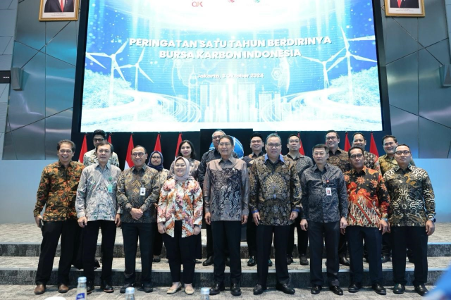
Photo Credit: IDX- First Anniversary of the Establishment of the IDXCarbon
On the day of the launch, there was one project listed with 16 service users. The following year, the project grew to three projects, namely Pertamina Geothermal Lahendong, PLN PLTGU Muara Karang and PLN PLTM Gunung Wugul, and there were 81 service users. Carbon units listed on IDX Carbon on the first day of launch were 842,950 tons of CO2e and after one year it was listed at 1,777,141 tons of CO2e.
In its development, great efforts are still needed from all stakeholders to further encourage carbon trading to realise Indonesia's potential in supporting global climate change mitigation. One year of IDXCarbon marks our readiness as a carbon exchange, not only for carbon certificates (referred as SPE-GRK), but also for the technical approval of emissions limits or allowances (referred as PTBAE-PU). PTBAE-PU trading through IDXCarbon will encourage carbon trading transparency, which is expected to improve the integrity of carbon trading in Indonesia.
IDX Net Zero Incubator Program as a Strategic Enabler for IDX-Listed Companies
On August 1, 2024, IDX launched the IDX Net Zero Incubator, a training program to help listed companies seeking to begin their decarbonisation efforts. As companies face stakeholder demand to commit to net-zero emissions, the IDX Net Zero Incubator program offers a structured pathway for achieving this goal. It equips companies with knowledge and technical capabilities in calculating emissions and reporting them in their Sustainability Report accurately and transparently. In addition, it can support companies in preparing business strategies to achieve decarbonisation targets, which in the future may increase the company's attractiveness and competitiveness, as well as create capital inflow opportunities through investments that prioritise low-emission environmental aspects.
The IDX Net Zero Incubator program consists of several continuous training modules, starting from introducing climate change risks, calculating emissions, planning decarbonisation targets and reporting emissions (climate reporting). It provides access to expertise, resources and the knowledge necessary for calculating GHG emissions, starting a decarbonisation journey and setting net-zero targets.
For IDX-listed companies, participating in the IDX Net Zero Incubator can facilitate and encourage companies to innovate towards the adoption of renewable energy solutions, energy efficiency measures, and circular economy practices, all of which contribute to reducing operational emissions. IDX, in collaboration with knowledge partners, establishes and promotes the net-zero incubator to help ensure that listed companies are not only compliant with emerging regulations, but also positioned to lead in sustainable business practices.
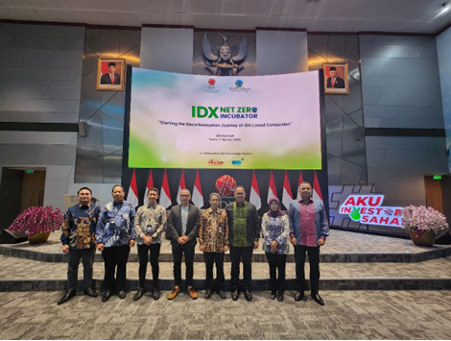
Photo Credit: IDX- IDX Net Zero Incubator Launch on 1 August, 2024
The enthusiasm of listed companies to take part in the IDX Net Zero Incubator program was quite high, with 110 companies registering and 215 representatives participating. The program is being held from August to November 2024 for listed companies using offline (in house) and online (webinar) training methods and is free of charge. IDX collaborates with CDP and PT Sucofindo as Knowledge Partners, who will be facilitators in the training held at the IDX Net Zero Incubator.
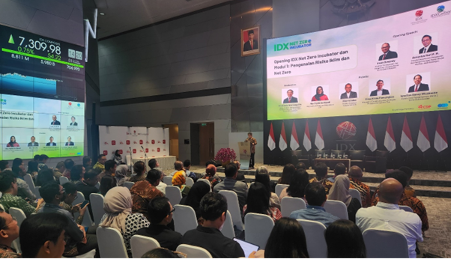
Photo Credit: IDX- IDX Net Zero Incubator
Integrating ESG Metrics Into IDX’s Listed Companies Reporting Platform:
The global push for sustainability is also reflected in the rising importance of ESG criteria in corporate reporting and investment decision-making. Investors today increasingly prioritise companies that demonstrate a strong ESG performance, which enhances long-term value creation while addressing critical social and environmental challenges. For IDX-listed companies, integrating ESG metrics into their reporting and data systems is not only necessary for maintaining investor confidence, but also for complying with global standards.
In line with this market trend, IDX has taken steps to promote ESG reporting through enhancing the listed companies’ disclosure systems by embedding the ASEAN ESG Common Core Metrics, to encourage transparency and accountability in the market regarding the ESG performance data of listed companies. However, the challenge lies in harmonising these metrics across the ASEAN region to create a standardised reporting framework. By collaborating with other ASEAN stock exchanges, including Bursa Malaysia, SET and SGX, IDX aims to develop common ESG data standards, allowing for greater comparability and facilitating cross-border investment flows. A unified ASEAN ESG metric reporting framework would benefit companies, investors and regulators alike, ensuring that sustainability practices are not only robust, but also measurable and trackable. This collaboration has been announced as a shared project called the ASEAN-Interconnected Sustainability Ecosystem (ASEAN-ISE), to advance ASEAN’s sustainable development through the implementation of common ESG metrics in their respective data infrastructures.
The ASEAN-ISE initiative was formalised at a recent meeting between the participating exchanges, marking an agreement on the foundational governance structure and operational blueprint for building the inter-connected sustainability ecosystem.
The intended outcomes of the ASEAN-ISE initiative include:
- Creating an integrated ESG ecosystem to promote the progress of sustainable development in ASEAN.
- Enabling participating exchanges to achieve economies of scale through cost efficiency and faster time-to-market with fit-for-purpose solutions.
- Empowering participating exchanges to proactively assist ESG-compliant corporates in maximising business value through quality disclosures. This involves developing infrastructure solutions to facilitate cross-border trade flows, connecting corporates’ supply chains to ESG-oriented investment capital, and providing suppliers with good ESG practices and disclosures to secure more competitive financing rates.
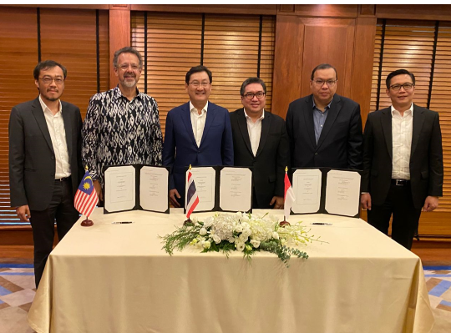
Photo Credit: IDX-Bursa Malaysia, SET, and IDX signed MOU as one of the initiatives.
Regional Collaboration With ASEAN Exchanges on ESG Standards
The integration of common ESG metrics across ASEAN stock exchanges offers significant potential for creating a more sustainable and interconnected capital market in the region. As countries within ASEAN have varied levels of economic development and regulatory environments, it is essential to establish a harmonised ESG framework that can be adopted across the region. Such a framework would not only streamline ESG disclosures for companies listed on ASEAN exchanges, but also enhance the appeal of the region for global investors seeking sustainable investment opportunities.
This collaborative effort, between IDX and other ASEAN exchanges can help ensure that ESG reporting becomes a regional standard, enabling the consistent tracking of sustainability performance across Southeast Asia. This regional integration would also support the goals of the ASEAN Capital Markets Forum (ACMF), which aims to create a region-wide, sustainable capital market ecosystem.
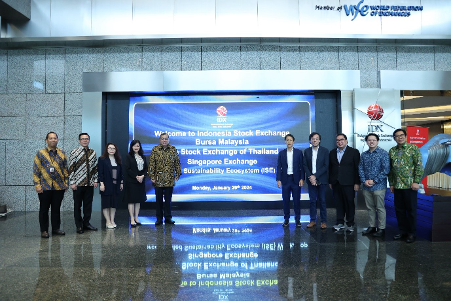
Photo Credit: IDX – ASEAN-ISE 29 January, 2024
The Strategic Importance of ESG Metrics for IDX-Listed Companies
For IDX-listed companies, integrating ESG metrics into their business strategies is becoming an increasingly important differentiator in a competitive global market. ESG integration is not only about compliance or meeting regulatory requirements; it is also a strategic tool for building long-term resilience, innovation and reputation. Companies that adopt strong ESG practices are better equipped to navigate environmental risks, manage social challenges and maintain robust governance structures, all of which contribute to their overall performance and value creation.
Moreover, as the global investor base continues to prioritise sustainability, companies that demonstrate commitment to ESG principles are more likely to attract capital, access new markets and improve stakeholder relations. For Indonesian companies, particularly those in carbon-intensive industries, adopting ESG metrics can also serve as a key step in mitigating the risks associated with climate-related regulations, such as carbon pricing, and in aligning with international frameworks.
As the Indonesian private sector continues to move toward a low-carbon future, the role of IDX in facilitating this transition is critical. By promoting carbon market participation, fostering sustainability-focused companies through net-zero incubators, and advancing the integration of ESG metrics in collaboration with other ASEAN exchanges, this integrated approach not only supports Indonesia’s national climate goals, but also enhances the global competitiveness of IDX-listed companies, ensuring they are at the forefront of the green transition.
Disclaimer:
The views, thoughts and opinions contained in this Focus article belong solely to the author and do not necessarily reflect the WFE’s policy position on the issue, or the WFE’s views or opinions.